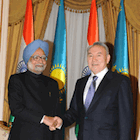 Indian Prime Minister Manmohan Singh's April 15-16 visit to Kazakhstan marked an important step forward in India's ties with the rising Central Asian nation. Relations between the two countries have gained momentum since January 2009, when Kazakh President Nursultan Nazarbayev was the chief guest at India's Republic Day celebrations.
Indian Prime Minister Manmohan Singh's April 15-16 visit to Kazakhstan marked an important step forward in India's ties with the rising Central Asian nation. Relations between the two countries have gained momentum since January 2009, when Kazakh President Nursultan Nazarbayev was the chief guest at India's Republic Day celebrations.
India and Kazakhstan established diplomatic relations in February 1992, with then-Indian Prime Minister Narasimha Rao paying a visit to Kazakhstan in 1993. Prior to his 2009 visit, Nazarbayev had visited India in 1996 and 2002.
In a positive development, Singh and Nazarbayev signed a "Joint Action Plan" on furthering the strategic partnership between the two countries through 2014 during Singh's visit. The plan envisages cooperation in a range of areas including hydrocarbons, civilian nuclear energy, pharmaceuticals, health, agriculture, space, information technology, cybersecurity, high-tech and innovative technology and cultural exchanges. But the good news cannot obscure the fact that trade ties between the two countries are disappointing, at best. Bilateral trade stood at around $314 million in 2010, an increase of around 24 percent over the 2009 figure of $253 million.
Nevertheless, ties with Kazakhstan have taken on crucial importance for India.
First, Kazakhstan has 15 percent of the world's uranium deposits and plans to produce 25,000 tons of uranium this year. Setting aside concerns stemming from the nuclear accident at Japan's Fukushima nuclear plant, India and Kazakhstan signed an agreement on "Cooperation in Peaceful Uses of Nuclear Energy" during the visit. The two countries have been involved in civil nuclear cooperation since January 2009, when Kazakhstan's KazAtomProm and India's Nuclear Power Corporation of India Limited signed a memorandum of understanding. KazAtomProm now supplies uranium for use in India's reactors.
Kazakhstan's uranium supplies take on added importance for India in light of New Delhi's ambitious plans to increase its nuclear energy production from its present 3,700 megawatts -- 3 percent of its energy needs -- to 20,000 megawatts by 2020. Australia, with almost 40 percent of the world's uranium deposits, has refused to supply uranium to India until New Delhi signs the Nuclear Non-Proliferation Treaty.
Second, Kazakhstan can also help meet India's burgeoning oil demand. India's 2010-2011 national economic survey predicts that the country will witness growth of around 8.6 percent during this period. To maintain such a dizzying pace, India will need a continuous supply of energy resources. One of the major outcomes of Singh's Kazakhstan trip was the inking of a joint exploration deal between India's state-owned oil company ONGC-Videsh and Kazakhstan's national oil behemoth KazMunaiGas that will give ONGC-Videsh a 25 percent stake in the Satpaev oil block in the Caspian basin. This 572-square-mile exploration block lies in the Kazakh sector of the oil-rich Caspian Sea and is in close proximity to major discoveries.
Third, New Delhi is trying to lure Astana away from Beijing's tight grip. In this, India will be helped by the strong people-to-people ties already established between India and Kazakhstan. Notably, Bollywood has played a part in promoting India's soft power in Kazakhstan, with many a Bollywood superstar enjoying a huge following in Kazakhstan, and many older Kazakhs still nostalgic about Raj Kapoor and Nargis, Bollywood stars who died in the 1980s.
Fourth, Kazakhstan has taken over the chairmanship of the Shanghai Cooperation Organization (SCO), to which India has already been granted observer status and would like to gain full membership. Reflecting Kazakhstan's increasingly pivotal role in the organization, it will host the SCO leaders summit in Astana in June. For India to be admitted to the group, Kazakhstan's backing will be essential.
Finally, the race between India and China for energy resources has spread to Central Asia, with China enjoying a significant head start. A deal to build the long-discussed Turkmenistan-Afghanistan-Pakistan-India pipeline was signed in December, but the project remains stalled by the security risks in Afghanistan and India's reticence about depending on Pakistan for its energy transit. By contrast, the Atasu-Alashankou pipeline transporting oil from Kazakhstan into China's Xinjiang province is already operational. Meanwhile, China's Guangdong Nuclear Power Group and Kazakhstan's KazAtomProm agreed on a deal that will see Kazakhstan sell up to 55,000 tons of uranium to China over the next 10 years -- meeting almost half of China's fuel requirements for nuclear power.
For its part, Kazakhstan has shown an interest in nurturing ties with India. Unlike China, it has lent its unequivocal support to India's quest for a permanent seat in an expanded United Nations Security Council. An influential member of the Organisation of the Islamic Conference, Kazakhstan condemned the 2008 Mumbai terror attacks. And Kazakhstan has sought India's assistance in its bid to join the World Trade Organisation.
With China developing ports and potential bases in Pakistan, Sri Lanka, Bangladesh and Myanmar -- all countries that New Delhi considers lying in its sphere of itnerest -- India is in a way returning the compliment in Kazakhstan. As India gets ready to play a greater role on the international stage, its ties with previously distant countries, like Kazakhstan, will become increasingly important.
Dr. Rupakjyoti Borah is a senior lecturer in the Department of Geopolitics and International Relations, Manipal University. He was a visiting fellow at the Centre of International Studies, University of Cambridge, U.K., in 2009. The views expressed here are his own.
Photo: Indian Prime Minister Manmohan Singh and Kazakh President Nursultan Nazarbayev, Astana, Kazakhstan, April 16, 2011 (photo from the Web site of the Prime Minister of India).
www.worldpoliticsreview.com




